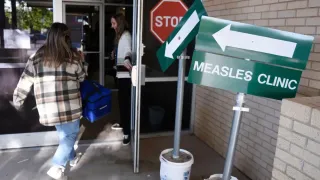May 2, 2016
Longtime Chef: Prince Fought Throat, Stomach Pains Recently
Kevin Burbach READ TIME: 3 MIN.
MINNEAPOLIS -- On stage, Prince was still captivating audiences at recent performances in Australia and California. He hosted a pop-up party at his Paisley Park studio, and there were few outward signs in his final months that anything was wrong.
But off stage, something was different. Prince began wanting meals that were easier to digest and was fighting off waves of sore throats and frequent upset stomachs, the musician's personal chef told The Associated Press.
A law enforcement official has told the AP that investigators are looking into whether Prince, who was found dead at his home on April 21, died from an overdose and whether a doctor was prescribing him drugs in the weeks beforehand. The official has been briefed on the investigation and spoke on condition of anonymity because he was not authorized to speak to the media.
Ray Roberts, who cooked for Prince nearly every day for almost three years, said in an interview that wasn't the man he saw nearly every night, "not even a hint. Not at all." But Roberts did start noticing changes in Prince's diet - he was eating less and drinking less water, and looked like he was losing weight.
"It felt like he wasn't himself probably the last month or two," Roberts said. "I think he was just struggling with being sick a lot."
Prince, who didn't eat meat, normally loved foods like roasted beets and minestrone soup with a harissa chermoula, an herb sauce from North Africa. In recent months, Roberts said, as Prince would have sore throats or seem like he wasn't feeling well for "weeks at a time," he would prefer smoothies and fresh juices to soothe his throat or stomach.
Stomach and throat ailments aren't unusual in a stubbornly cold Minnesota winter, and to the public, there was little to suggest something was amiss.
Since Prince's death, fans who saw him recently have talked about his energy and his mesmerizing performances with just a microphone and a piano. Many who saw his final public appearance at Paisley Park only days before he died said he may have seemed more tired - one person who was at one of his last shows in Atlanta said his speaking voice was weak at times - but overall he was not changed.
"He seemed fine. He looked normal and he had this kind of energetic glow that he always had," said Lars Larson, a Minneapolis man who often worked at Paisley Park for Prince's parties.
Even in private, Roberts said, Prince would soldier through and work. "It was amazing. I don't think I ever saw him really looking bad ever. He was always on point," he said.
Roberts and his wife began cooking for Prince in 2013 after an informal tryout with several other chefs, and he made all his meals for the musician in the restaurant-grade kitchen at Paisley Park.
Most of the time, Roberts would make light salads and soups - he said Prince particularly liked the roasted beets as well as a pesto broccolini dish. When Prince was gearing up for more shows and wanted to be more active, Roberts would scale back the sweets.
As for meat, there was none of it.
"I don't know if it was just an unwritten rule, but there was no meat there - ever," he said. "If somebody wanted to eat meat, they would have to eat it in the parking lot. And he was very serious about this."
Roberts saw Prince nearly every day. He cooked for him every day except Sunday - and sometimes even then. Combined with the four Peoples Organic restaurants he and he wife run in the Twin Cities, Roberts said he was working about 100 hours a week, with his schedule tightly tethered to Prince's. The musician would even bring Roberts and his wife on tour around the country at times to cook for him.
Still, Roberts said it was a dream job and he relished the opportunity to listen to Prince practice and jam with other famous musicians, never knowing who he would be cooking for next. He said Prince had a "higher purpose" and that while he could be a joker or even cocky, most of the time he was a "caring, thoughtful person" who apologized if he was running late and considered his employees family.
"I wish he was still here," he said, wiping away a tear. "That's what it boils down to."
Roberts last saw Prince the evening before the musician was found dead at Paisley Park. He cooked Prince a roasted red pepper bisque with a kale and spring vegetable salad. But Prince never ate it. When he returned to the musician's studio home for his memorial service a few days later, Roberts found it in the refrigerator - just as he'd left it.






